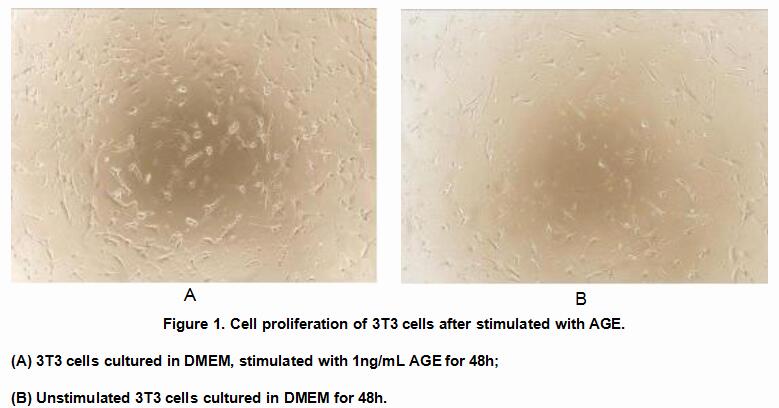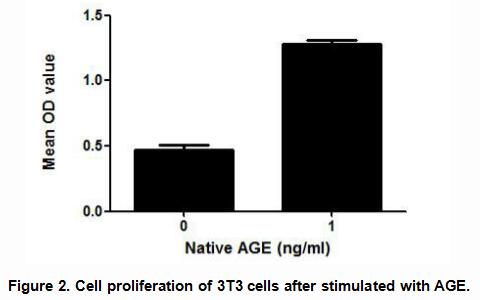Active Advanced Glycation End Product (AGE)
AGEs; Advanced Glycation End Products
- Product No.APB353Ge01
- Organism SpeciesPan-species (General) Same name, Different species.
- Buffer FormulationPBS, pH7.4, containing 1mM DTT, 5% Trehalose and Proclin300.
- TraitsFreeze-dried powder
- Purity> 90%
- Isoelectric Pointn/a
- ApplicationsCell culture; Activity Assays.
- Download Instruction Manual
- UOM 10µg50µg 200µg 1mg 5mg
-
FOB
US$ 160
For more details, please contact local distributors!US$ 400
For more details, please contact local distributors! US$ 800
For more details, please contact local distributors! US$ 2400
For more details, please contact local distributors! US$ 6000
For more details, please contact local distributors!
ACTIVITY TEST of the Active Advanced Glycation End Product (AGE)


Glucose and other reducing sugars can react non-enzymatically with the amino groups of proteins to form compounds called advanced glycation end products (AGEs). AGEs exert their cellular functions via the interaction with receptor for advanced glycation end products (RAGE). It has been reported that AGE stimulates the differentiation and proliferation of 3T3, thus a proliferation assay was conducted using 3T3 cells. Briefly, 3T3 cells were seeded into triplicate wells of 96-well plates at a density of 2,000 cells/well and allowed to attach overnight, then the medium was replaced with serum-free standard DMEM prior to the addition of various concentrations of AGE. After incubated for 48h, cells were observed by inverted microscope and cell proliferation was measured by Cell Counting Kit-8 (CCK-8). Briefly, 10µL of CCK-8 solution was added to each well of the plate, then the absorbance at 450nm was measured using a microplate reader after incubating the plate for 1-4 hours at 37°C. Proliferation of 3T3 cells after incubation with AGE for 48h observed by inverted microscope was shown in Figure1. Cell viability was assessed by CCK-8 (Cell Counting Kit-8 ) assay after incubation with recombinant AGE for 48h. The result was shown in Figure 2. It was obvious that AGE significantly increased cell viability of 3T3 cells.
USAGE of the Active Advanced Glycation End Product (AGE)
Reconstitute in PBS (PH7.4) to a concentration of 0.1-1.0 mg/mL. Do not vortex.
STORAGE of the Active Advanced Glycation End Product (AGE)
Avoid repeated freeze/thaw cycles. Store at 2-8°C for one month. Aliquot and store at -80°C for 12 months.
STABILITY of the Active Advanced Glycation End Product (AGE)
The thermal stability is described by the loss rate. The loss rate was determined by accelerated thermal degradation test, that is, incubate the protein at 37°C for 48h, and no obvious degradation and precipitation were observed. The loss rate is less than 5% within the expiration date under appropriate storage condition.

